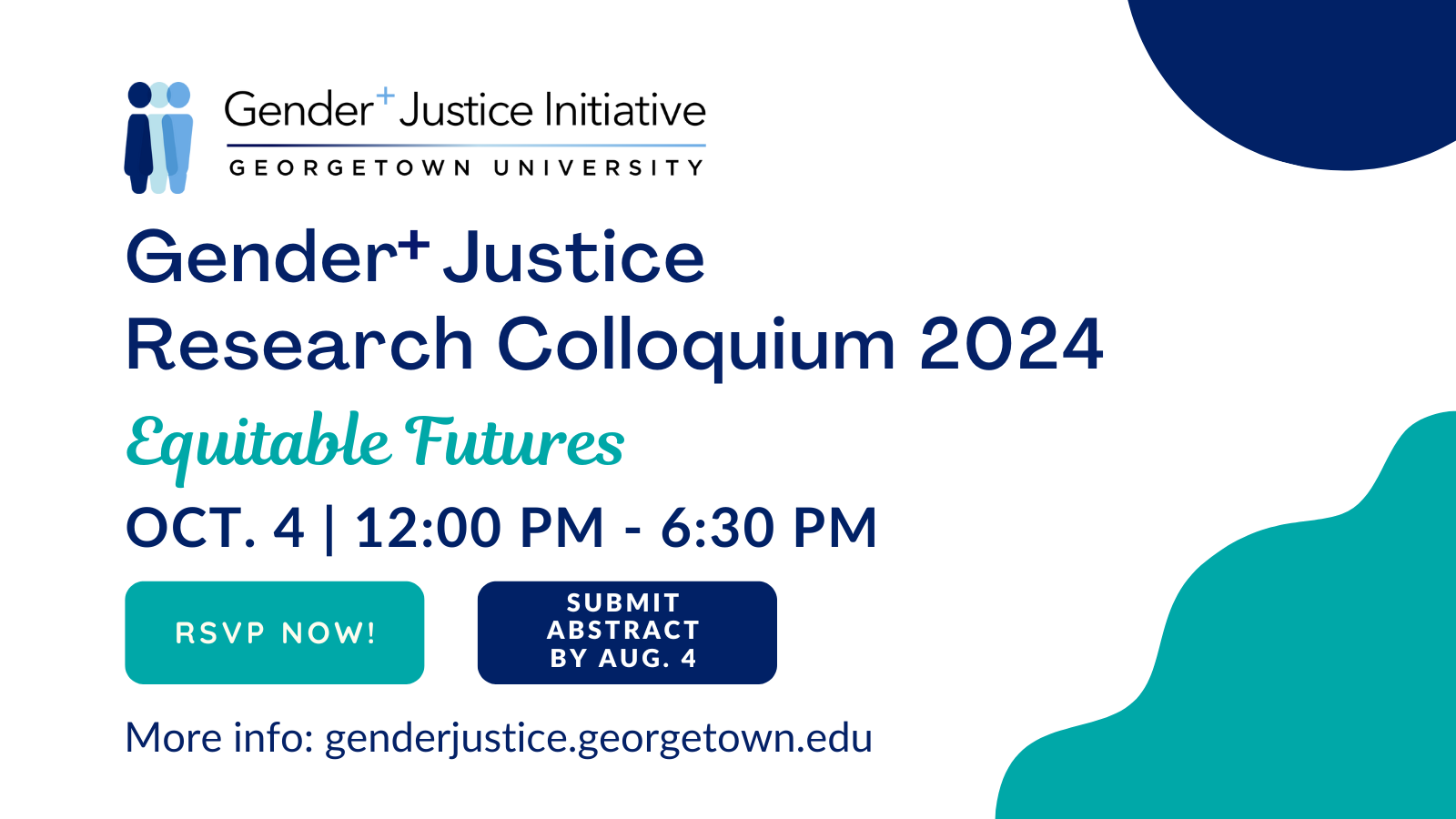Research Colloquium 2024

Posted in G+JI Events
The Gender+ Justice Initiative presents its sixth Research Colloquium!
The Georgetown University Gender+ Justice Initiative is thrilled to announce the return of its signature event, the Annual Research Colloquium, now in its sixth edition! This fall, on October 4, 2024 we invite faculty, postdoctoral fellows, and graduate students from across Georgetown and from neighboring universities to share their work and discuss opportunities for interdisciplinary conversations on intersectional issues of gender, racial, and economic justice and beyond.
This year, we are pleased to introduce thematic areas to foster in-depth conversations on timely and pressing issues. Under the theme of ‘Equitable Futures’, the topic areas for the 2024 G+JI colloquium panels are:
Equitable Futures
- Health Equity: Reproductive Justice, Anti-Racism, and Public Policy
- Sustainability: Gender and Racial Climate Justice
- Democracy: Intersectional Feminist Perspectives
Call for Proposals
We encourage proposals that delve into these themes from diverse perspectives and methodologies, at any stage of development—from initial vision to finished paper. Our aim is to curate interdisciplinary panels based on the submissions, with presentations lasting 8 to 10 minutes each, followed by discussion with the audience. The day will conclude with a reception, providing ample opportunity for networking and further dialogue.
In addition to our internal Georgetown community, we are eager to expand the colloquium’s reach to universities in the DC / Maryland / Virginia region. We warmly invite faculty from neighboring institutions to participate, enabling us to forge connections across universities and enrich our interdisciplinary conversations on the crucial issues surrounding racial and gender+ justice.
We are excited to explore and collaborate in an effort to think capaciously about today’s challenges and envision more equitable futures. We eagerly anticipate your proposals and the vibrant discussions they will spark.
Date: October 4, 2024
Time: 12:00 PM – 6:30 PM – Reception after 5:30 PM
Location: Riggs Library, Georgetown University Main Campus
Deadline to submit abstract: August 11, 2024
More information on the 3 thematic panels:
Health Equity: Reproductive Justice, Anti-Racism, and Public Policy
Papers in this topic area should explore the intersectional dynamics of health equity, focusing on reproductive justice, anti-racism, and public policy. We welcome explorations of how race, gender, and socio-economic status shape healthcare access and outcomes, advocating for innovative solutions and policy. We are interested in discussions aimed at envisioning inclusive healthcare systems prioritizing marginalized communities and dismantling systemic barriers to health equity.
Sustainability: Gender and Racial Climate Justice
This panel will delve into the intersections of gender, race, and climate justice, exploring how marginalized communities are disproportionately affected by environmental degradation and climate change, addressing topics such as environmental racism and gendered impacts. We are interested in work that promotes inclusive and equitable approaches to environmental conservation and climate action, centering the voices and needs of marginalized groups.
Democracy: Feminist Perspectives
Proposals related to this theme should critically engage with democracy through an intersectional feminist lens. Proposals may examine issues such as representation, participation and governance, aiming to advance intersectional justice and equity within democratic frameworks. Against the backdrop of escalating threats to democracy, including the erosion of civil and human rights and the rise of authoritarianism, this theme will serve as a platform to reimagine and redefine democracy to better reflect diverse needs and experiences with a particular focus on marginalized groups, thus fostering a more inclusive and robust democratic landscape.
